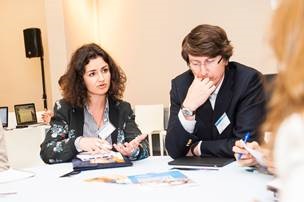What is business incubation?

By Andrew Kitchen, Incubation Coordinator, Ramulus Ltd.

The prize for each Europeana Creative Challenge is a ´business incubation support package´. This blog explains what exactly it is and how it can be used by the winners to bring their product successfully to the market.
The term incubation is used in the context of business to describe a process aimed at Small and Medium Enterprises (SMEs) or start-ups to provide development and growth at an above average speed. An incubator is an organisation that provides the incubation support.

Traditional business incubators do not normally provide financial support. Rather, they provide other facilities, resources and services as an alternative. This normally includes a provisional office space that is typically shared with other SMEs and start-ups, allowing for peer networking and collaborative organisational development. A range of ‘hands-on’ activities and mentoring aimed directly at taking the business to the next level (hence the incubation analogy) are normally provided in addition. Generally, incubators provide assistance for periods of greater than 1 year.
You may also have heard the term accelerator used in a similar context. An accelerator differs from an incubator in a number of ways. Firstly, the support given to accelerate a business to market is normally provided in exchange for equity (a share of ownership) in that business. Secondly, the support is given in a more condensed or intensive manner and over a much shorter period of time than an incubator - mostly 3-4 months. Thirdly, an accelerator often provides a degree of financial support to the business it is supporting to enable its growth. Incubators and accelerators normally provide their services to SMEs and start-ups that are physically located near to them.
In the Europeana Creative project, a localised approach is not feasible as we are reaching out to a European audience. We are developing Europeana Labs as a virtual space to support a European audience and are integrating incubation support in the second half of this year. As the project is also time-bound, we have taken the most suitable aspects from both incubators and accelerators to produce our own ‘hybrid’ business incubation package that forms the prize for each Challenge winner. This package has been developed in a pragmatic manner, which embraces virtual tools and techniques, to deliver a range of traditional incubation support within the condensed timeframe of an accelerator.
Apply to the Challenges to win this prize.
If you still have any questions drop us a message on Twitter or Facebook.
Tweet !function(d,s,id){var js,fjs=d.getElementsByTagName(s)[0];if(!d.getElementById(id)){js=d.createElement(s);js.id=id;js.src="http://pro.europeana.eu//platform.twitter.com/widgets.js";fjs.parentNode.insertBefore(js,fjs);}}(document,"script","twitter-wjs");Follow @EuropeanaEU !function(d,s,id){var js,fjs=d.getElementsByTagName(s)[0];if(!d.getElementById(id)){js=d.createElement(s);js.id=id;js.src="http://pro.europeana.eu//platform.twitter.com/widgets.js";fjs.parentNode.insertBefore(js,fjs);}}(document,"script","twitter-wjs");
